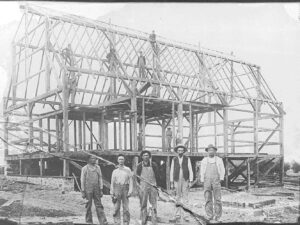By David Fleet
Editor
Hadley Twp.-At 6:30 p.m., Sept. 2, the Hadley Township Historical Society will host Farms, Barns and Yarns featuring Jim Mulvany of the Michigan  Barn Preservation Network.
Barn Preservation Network.
The event will be at the Hadley Township offices, 4293 Pratt Road, Hadley.
“Since every barn has hidden stories to tell, we will take opportunities to just laugh and treasure the interesting lives of our ancestors who worked so hard and loved the land so much,” said Mulvany, a.k.a., “The Barn Man,” who grew up on a farm homesteaded by his great-grandfather in 1844 in Calhoun County.
“It will bring to light important events and policies that helped make agriculture prosper in the late 19th and early 20th centuries.” Mulvany’s presentation will recognize the various architectural features of Michigan barns that identify and time date The presentation will identify agricultural practices that changed over the years and how farmers adapted barns to be useful over the past 200 years.
“Many of the barns today were built between 1895-1910, the ‘Golden Age’ of barns,” said Mulvany, who earned a Bachelor’s of Science degree in Agriculture and Masters of Science in Agriculture Economics at Michigan State University. His degree in 1956 was the first from Michigan State “University,” rather than Michigan State “College.”
“That era was the prime time for Michigan where our state was the economic engine of the country,” he said. “Consider the 1871 Chicago Fire brought economic prosperity due to the logging industry in Michigan it also grew farms and a booming economy.”
About that same time Detroit native William Davis, a fish market owner devised a refrigerated boxcar based on fellow Detroiter J.B. Sutherland’s design of containers with ice and gravity-forced air circulation. Sutherland was the first to patent the railroad refrigerator car, so meat and other Michiagn products could be shipped out of state.
“As a result, local products could be shipped to the East Coast,” he said. “At that time a family could make a decent living on the farm, so it was a barn boom.”
While the era of the traditional barns has since faded, memories continue for many Michigan residents.
“People grew up living on farms or at least having a barn experience, such as swinging on a long rope attached to a beam, jumping in the hay loft or walking on the old hand hewn beams from fallen logs,” said Mulvany.
“It’s the love affair with Little House on the Prairie, every barn tells a story.”
Following graduation, he taught vocational agriculture for two years at Lake Odessa, Mich and from 1960-1975 he served as Ingham County agriculture agent and extension director. In addition, from 1975-1989 Mulvany managed the Extension program titled Telfarm at MSU, a program that served 1,500 farms of Michigan with computerized accounting and management records. Currently, he is self-employed as a Farm Management Consultant and Tax Accountant.
